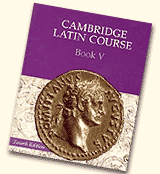Without a child of his own, Domitian is anxious to adopt one as an heir. In fact, not one - but two! The boys' father, Flavius Clemens, should be pleased, but Domitian's also got plans for his daughter - wedding plans! Can Clemens change the opinion of the Emperor... is it wise to even try?

We move forward six years to the year AD 90. Domitian is still Emperor, but he's got things on his mind - important things such as heirs-to-the-throne and wedding bells! Could there be, for once, a happy ending in Imperial Rome?
The Stories
Poor Polla! The teenage daughter of Flavius Clemens is in love with our rustic Helvidius whom we met in Stage 35 - but the Emperor Domitian wants her to marry a twice-divorced, fifty-something Senator! What can she do? She knows that dynastic alliances come before love in Roman aristocratic families...
It's the day before her wedding - and Polla is distraught! If only her beloved Helvidius would come and take her away from all of this madness! In fact, he's closer than she thinks... and the seeds are sown for a dramatic wedding day.
The wedding ceremony is about to begin! The guests seat themselves, while Polla prepares herself to meet and be married to Sparsus. The Chief Priest officiating at this traditional Roman marriage is none other than the Emperor himself!
Light the torches and strike up the music! Join the traditional, rowdy, torch-lit procession leading the bride from her house to that of her new husband!
As the procession reaches the groom's house, a young man rushes out from the shadows and attacks Sparsus! Confusion reigns. Who's the attacker? Is Sparsus alive or dead? Can Polla escape her destiny?
Virgil may have poetically written that "Love conquers all" but he never told these Roman poets! Here are three, off-beat Latin poems about love and marriage. The first two poems are by Martial (XII.46 and IX.15) and the third is attributed to Petronius.
Practising the Language
Activities for vocabulary revision and language practice:
Test your Vocabulary is against the clock and can be set to all words in this stage, up to this stage, etc.
Word Endings exercises are based on the Practising the Language section in the Books, and follow this format. Click here for more information.
Word Endings activities are based on the Practising the Language section of each Stage, and all follow the same format. The user is given a sentence in English together with the same sentence in Latin, but with one or more endings to be chosen from a drop down list. In most exercises the endings omitted are restricted to one particular part of speech (noun, verb or adjective). For this type of exercise language information is provided. This can be called up by the user at any time by clicking on LANGUAGE INFO. But in some exercises, all noun, verb and adjective endings are omitted. For this more demanding exercise, LANGUAGE INFO provides only reference to the relevant pages of the Cambridge Latin Course.
Sorting Words asks you to sort words by meaning, case, etc.
Practising the Language exercises are digital versions of exercises in the Cambridge Latin Course textbooks.
Please note: the Cultural Background weblinks section has been removed.



